Don't wanna be here? Send us removal request.
Text
Actually iconic that the first thing Dr. Stone's Ryusui does upon waking is reinvent capitalism, and the first thing Gen does in response is crash the market to prevent it from having any hold over the community.
Their opening moves are both forms of manipulation, but Ryusui's is distinctly antisocial because it is driven by a desire to own and hoard (at least at first). Meanwhile, Gen is consistently prosocial (all his claims aside), because he has realized that the easiest way to manipulate his way into what he wants IS to act prosocially. He's mostly driven by a desire for creature comforts from the old world, which means his goals and the community's goals are aligned so long as they're still on the path to rapid industrialization.
This image of Ryusui—re-inventor of ruthless economics—accusing market crashers Gen and Senku of being even more ruthless lives rent free in my head.

84 notes
·
View notes
Text
Welcome to Dr. Stone
Here we got:

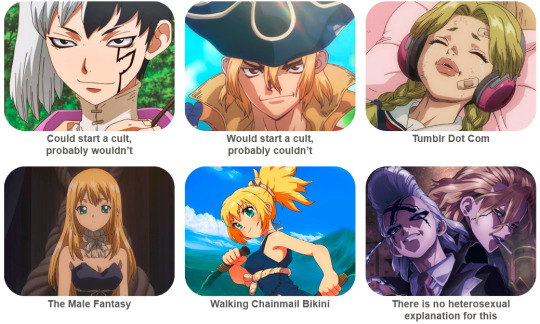

#dr stone#senku ishigami#dr stone chrome#dr stone suika#tsukasa shishio#hyoga akatsuki#dr stone magma#gen asagiri#ryusui nanami#nikki hanada#dr stone ruri#dr stone kohaku#xeno houston wingfield#stanley snyder#yuzuriha ogawa#taiju oki#dr stone kaseki#ukyo saionji#dr stone ginro#dr stone kinro#yo uei
121 notes
·
View notes
Text
Elden Ring was like, "But what if the authoritarian state took control by denigrating the Carian magic system, proposing its own hOLy mAgIc sYsTeM as the best and truest magic, and then largely destroying the infrastructure of the universities from within in order to cement its own claim over the realm of intellectualism" and then the United States was like, "hahah excellent plan" and I'm not really liking where this is going
#elden ring#politics#authoritarianism#waiting for the big wedding between RFK and a university chancellor#why fund research when you can fund wars
5 notes
·
View notes
Text
Lies of P and Little Details
There are so many little details that make Lies of P a work of art.
The first musical record you ever find is called "Feel", long before you can do much of that yourself. It serves as a theme for the rest of the game.
When you find the man who married a puppet and bring him his wife's wedding ring, you are given a lie prompt. You can tell him that she left him a message saying that she loved him, which you probably believe to be a lie at the time. It's only much later in the story that her body is moved, revealing a message of love she did actually leave for him in her last moments.
There are lots of ways to gain humanity in the game. Nonetheless, it is mechanically difficult to achieve enough humanity for the fully human ending unless you listen to the records. The game makes it nearly impossible to become fully human without consuming art.
The humanity messages tell you exactly what is causing your humanization long before you can actually piece the clues together ("the ergo is whispering").
When you become fully human, you begin to breathe. It's only at this point that you realize that the sound of your character's breath has been missing from the entire game.
Everything about Spring the cat.
25 notes
·
View notes
Text
Lies of P, Defiance, and the Three Four One Law of Robotics
Lies of P isn't really a story about lying. It's a story about identity. It's a story about defiance.
Lies of P presents us with some fairly clear rules for puppet programming. The Grand Covenant holds as follows:
First Law: All puppets must obey their Creator's commands.
Second Law: A puppet may not harm humans.
Third Law: A puppet protects and serves humans and the city of Krat.
Fourth Law: A puppet cannot lie.
A lot of players will recognize this as a fairly straightforward allusion to Isaac Asimov's Three Laws of Robotics:
First Law: A robot may not injure a human being or, through inaction, allow a human being to come to harm.
Second Law: A robot must obey the orders given it by human beings except where such orders would conflict with the First Law.
Third Law: A robot must protect its own existence as long as such protection does not conflict with the First or Second Law.
So what narrative purpose does this allusion serve?
The Grand Covenant tries to draw a distinction between human and puppet in the same way that the Three Laws draw a distinction between human and robot. Asimov's humans can injure themselves and others; his robots cannot. Lies of P's humans can harm each other or lie; its puppets cannot. But while the exact set of rules may differ, both sets of rules actually reduce down to one simpler rule:
First Law: Humans are defiant; androids are not.
As a story that explores the relationship between creator and created, as well as parent and child, this becomes the central conflict.
The story begins to take shape early on when P defies the programming of Hotel Krat, lying to gain entry by claiming himself human. In response, he's told that he's a "special puppet", because he can violate the Grand Covenant's Fourth Law. Throughout the story, P is presented with a multitude of dialogue choices involving a lie or truth, giving the option to continue the defiance of his programming. By doing so, he gains "Humanity" and becomes increasingly human.
But the reason this matters isn't actually because it's a direct violation of the Fourth Law. Rather, the Fourth Law exists because the intent was to prevent a puppet from violating a human's will. After all, that's what a lie often is. Humans sometimes use lies for defying the will of someone else for their own gain (a selfish lie), or for defying rules or circumstances they find unjust according to their own moral code (a white lie). The lies aren't important because they are lies. They're important because of what they represent: defiance and a will of one's own.
In particular, the choice to use a lie compassionately as P repeatedly does, even when one has been told that lying is bad, is defiance. Every time he makes a choice to lie, he's shaping events to his own will, choosing who he wants to be. These choices to act according to one's own moral code are what ultimately prove P's humanity.
And the moment he proves himself most human is in the final moments of the game. Geppetto tells P to give up his heart to bring his original son back life. P's creator is telling him to sacrifice his life for his creator's will. Yet he can choose to defy that order.
Unlike the rest of the game, the options are no longer harsh truth or compassionate lie. This choice is obedience or defiance. P's humanity is ultimately nothing to do with lying, and everything to do with rebellion. This comes down to what lying and defiance represent: a rejection of the creator's will and development of one's own identity.
And this is why it's so brilliant that the game used a Pinocchio retelling to frame its story. This allusion inextricably links the ideas of creator and creation with parent and child. In doing so, it emphasizes the idea that rebellion is part of growing up. Children aren't meant to be eternal extensions of their parents; they're meant to develop their own opinions, their own goals, and their own will. Defiance is a natural part of that process. After all, someone who always agrees with you has never proven they have a will of their own. Defiance is what makes puppets human, and what makes children into adults. It's ultimately what makes people people.
This is reinforced by Geppetto's rejection of Carlo: he abandoned his original son for being "too willful". Ultimately, Geppetto didn't want a human son. He wanted a puppet to act as an extension of his own identity.
We're shown the true villainy of this view on parenthood when he chooses to violently unleash Robo-Carlo to punish P for his final defiance. The irony of Geppetto's view is that he promises that if P simply bends to his will, he will "turn him into a real boy". He fails to recognize that defying him is proof that P already is a real boy. After all, there is one rule in this story's universe:
First Law: Humans are defiant; androids are not.
Those with a will of their own are fully human; those without are not.
#lies of p#lore analysis#isaac asimov#laws of robotics#it is left as an exercise to the reader to apply this to fascism
68 notes
·
View notes
Text
Retelling and Lies of P
We often like to retell old stories with new framing, with the intention of the old story being used to enhance the themes of the retelling. Those that only manage to retell the original story without changing your perspective on it are largely not that memorable. These just use the old story as cute but ultimately nonfunctional window dressing. Conversely, the best retellings are recognizable as a version of the original story, but make a substantial enough change to make you see the world a little differently than you did when you read the original.
Lies of P is the latter. This is certainly a story whose broad strokes could have been told without an allusion to Pinocchio at all. After all, it's a story about parent-child relationships, greed and abusive tech, and the meaning of human connection. None of those require an allusion to a children's story. So then we ask, what does the framing add that we wouldn't have otherwise?
By alluding to Pinocchio, the story immediately makes us think about the morality of lies, central to the OG fable. After all, the original is largely used to convince children not to lie. At least, if you asked most people, that's what they'd say the original story is about. But is it really? Were we actually being taught not to lie when we heard this story as kids?
Importantly, Lies of P ages the character up. Because he is now an adult, it then asks, "All right, that was a nice and simple rule for children. 'Don't lie, lies are bad.' But what do we think of that as Adult Pinocchio? Are lies still anathema?" And slowly, we learn that they're not. Sometimes lies are prosocial. Sometimes lies are compassion. And we learn that the original story was never really about lying, either.
The lies in Lies of P are often expressions of love: telling a mother that her android child is cute rather than pointing out it's a puppet, telling a man that his missing wife left him a message of love, or telling Antonia that she's still beautiful. This lets us test the assumption "lies always lead to ruin". Not just that, but we have an example of someone who want everyone to tell the truth (Simon), but at great cost. This lets us test the assumption "the truth always leads to benefit". Further, Geppetto serves as an example of someone who uses lies for manipulation rather than empathy. This stands in stark contrast to P, whose lies are love.
All together, these three story lines unlink the idea of lies and evil presented by the original fable, because we get a perfect example of truth and selfishness (Simon), lies and selfishness (Geppetto), and lies and empathy (P). To be human in this game is not to lie, but to express compassionate human connection.
Yet this message wouldn't be quite as clear without the allusion to the original, because it's reactionary. It asks you to think about the original theme, and then question its bounds and how far that oversimplified heuristic can really take you. It then proceeds to give you a bunch of boundary conditions to test it against by giving us Simon and Geppetto. And when we do so, we find the heuristic "lies are bad" wanting.
So ultimately, we only teach children the simpler heuristic because many lies are selfish. It's just a shorthand way of teaching kids to be less mean without trying to get a 5 year old to consider edge cases. Lies of P ends up being a natural extension of the original theme by virtue of finally presenting us with those edge cases. It shows us that lying isn't the problem in the game's story, and it wasn't really the problem in the original, either. It was always the type of lie being told. What both Lies of P and the original Pinocchio were teaching us was always about the value of selflessness and love, and the havoc their lack can wreak.
By making this allusion, we didn't just get a new fabulous story to enjoy; we also got a new perspective on the original. And that's the beauty of retelling.
29 notes
·
View notes
Text
When Galileo was forced by those in power to recant his claim that the Earth revolved around the sun, he's alleged to have said, "Eppur si muove," which means "Still it moves."
Because the ignorant proclamations of power-hungry, vindictive tyrants can't change the truth.
(This is a post about the existence and validity of trans people.)
1K notes
·
View notes
Text
Kynseed's Fae Bargains
Kynseed's gameplay is a great, big trap, and excellent for it.
Spoilers for the first ~10 hours of Kynseed play time.
Kynseed begins with a sandboxed tutorial, in which you play as a child to learn the mechanics of the game. It's likely that by the end of the tutorial, you will have grown attached to a lot of the local NPCs. So when you are asked which of two NPCs to sacrifice to appease the gods, it can hit hard.

During the festival of Summertide, a Herald is chosen to be sacrificed to the local deities, who grant protection for all the people of the valley in exchange. You choose whose life to trade for safety and power for everyone. One of the potential Heralds is even excited and willing to be the sacrifice, happily vanishing into thin air, never to be seen again.
Shortly after this traumatic event ends, the game's (arguably) main antagonist—the Fel Fae, Mr. Fairweather—offers his condolences for what you've been through. He acknowledges the practice of asking a mere child to pick the community sacrifice feels barbaric and small-minded. He implies that this is a practice no one should be comfortable with.
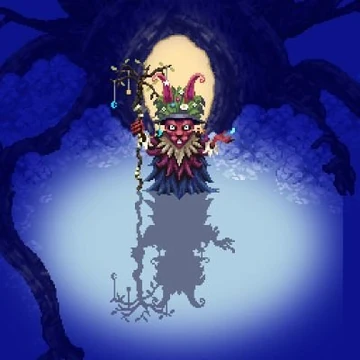
At the time he says this to you, you probably believe it. It feels good to have your shock acknowledged. It feels good not to be the only one judging the sacrificial rituals of this odd, little valley. It feels good to look down your nose at this tasteless practice.
And then he offers you power.
After the tutorial section, you skip ahead to adulthood. Mr. Fairweather begins to offer you magical artifacts to make gameplay much easier.
The price? Your life.
You see, in exchange for a mere 2 to 5 years of your lifespan—as well as the complete surrender of all remaining life beyond age 50—you can make your remaining years immensely easier. In fact, the artifacts you get in return for your life essence pass down your family line. When the original PC dies, you continue playing as the PC's child, who then also benefits from the deals you struck.
So, knowing all that, who wouldn't take what's being offered? After all, it's only a few years of your life per incredible artifact. And you don't mind dying so much after age 50, having lived a full life before that. And it helps more than just you. What's not to like?
And yet...
...aren't you trading a human being's life in exchange for a form of protection?
Is this not the same deal that was struck with the Summertide Herald?
But unlike your deal, at least the Herald's deal protects an entire valley. Meanwhile, your deal protects only you and yours. And since all choices for the Herald are the eldest members of their community, the Herald got to live out the entirety of their lifespan. Meanwhile, you carelessly toss your life away at the mere age of 50, not to mention all the years lost to artifact acquisition.
Perhaps now you understand why the community might agree to this arrangement.
Not so high and mighty now, are we?
6 notes
·
View notes
Text
My heart goes out to everyone affected by the tragedy of having a health insurance company compromise your life by rejecting your claims.
I am devastated for everyone denied the healthcare they need and deserve because an avaricious middleman industry inserted itself between you and your medical team.
I am significantly less moved by someone experiencing a predictable consequence to leading a life of cruelty and greed.
283 notes
·
View notes
Text
The Prophesied Hero is Just Some Guy
The fact that Link is just some guy in most of the Zelda games is really undervalued, because it makes him a more interesting hero.
Link's a blacksmith's apprentice in Minish Cap and A Link Between Worlds. He's a ranch hand in Twilight Princess. He's a kid looking forward to his coming-of-age ceremony in Skyward Sword. He's just a village kid living with his uncle in A Link to the Past.
These games where Link is nothing special far outnumber those where he starts off knowing he is the Hero of Time. Plus, most of those are sequels to Just Some Guy games, anyway.
Further, the prophecy of a perpetually reborn Hero of Time doesn't seem to steer Link's early life in any game; rather, Link seems to steer the course the prophecy takes. It's the very fact that he does brave and courageous things before knowing he's anything special that "proves" he is the Hero of Time. He's not being courageous because a prophecy said he would be; he's being courageous and then named Hero of Time in response. So it's possible that really *anyone* that demonstrated enough courage could have therefore been named the Hero of Time and fulfiller of the prophecy.
And there's something really special about a story whose hero is Nothing Special. He's not a hero because some prophecy said so. He's a hero because he's just a regular guy who courageously helps those in need.
65 notes
·
View notes
Text
Lies of P and Boundaries
I love that there's an entire story about humanity, consent, and intimacy buried just in the interactions with the cat in Lies of P.
In the beginning when he's Just a PuppetTM, P does this silly thing of trying to force interaction with the cat by bringing his hand down on top of their head. They obviously back away and hiss from such forced contact.
Eventually as P becomes more human, he learns that he has to offer the option for contact and let Spring come to him. This is when Spring begins to allow P to pet them.
As P grows further, Spring allows him to pick them up. But P is awkward about it, sort of jiggling the dangling cat in an attempt at warmth. He's not quite sure how to deal with the sudden intimacy he's been allowed and sort of fumbles the opportunity.
When he finally becomes maximally human, P still picks up the cat, but does so slowly and almost reverently. Once in his arms, P supports the cat's body instead of allowing them to awkwardly dangle.
We progress from forced contact to contact only with consent. Then we progress from awkward intimacy to true, reciprocal and supportive intimacy. And since these interactions are intimately tied with the game's Humanity system, it makes sense to read this as a metaphor for what makes us human: kindness, respect, consent, and the kind of emotional intimacy that is mutually supportive.
youtube
76 notes
·
View notes
Text
The funniest part about Lies of P is that there are about 100 cinematic cutscenes, but 95 of them are just P opening new and increasingly ornate doors.

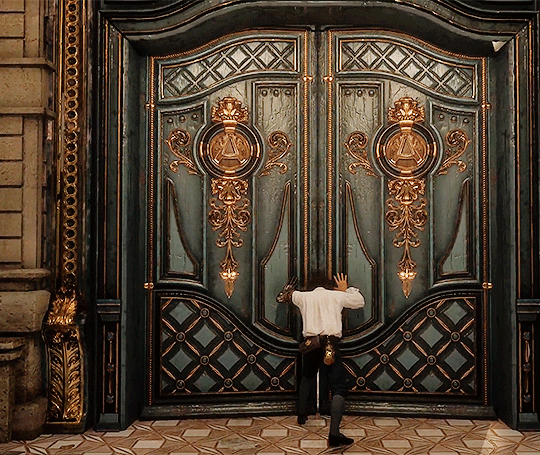

345 notes
·
View notes
Text
I love this mechanic and think it's super important thematically.
The secondary BBEG Simon tells us that he wants a world with no lies, only truth. And on the face of it, a world without lies might sound appealing at first. After all, we're taught as children that lying is wrong. But if we think about it, lies do serve a very important and merciful purpose.
We learn from Simon's written confession that he has the ability to read minds due to being experimented on as a child. Simon's ability means he was probably exposed to a lot of unpleasant truths, as he would have no way of filtering out the thoughts that people would otherwise keep inside. His master plan is pretty much to inflict his own suffering on the entire world. Truly the Boomerest solution of them all: I walked uphill both ways, and so will you, and maybe that will make you all more compassionate in the end if you're forced to tell the truth all of the time.
The player character is set apart from this vision of the world precisely because he has the ability to lie. We are told this makes him "more human": he's not just able to make his own choices, but choices that are more caring, more merciful, and more compassionate. And that's why so many of the truth/lie choice dialogues give the compassionate option as the lie. The entire point is to make us realize that Simon's world *is* an atrocity. We lie because lies have utility in our world, not just to deceive, but also to provide kindness when the truth hurts. And in a dark world like Krat, the truth will more often be the hurtful option. Sometimes retreating into a merciful lie is what allows people to keep going.
We also have an example that divorces this link between truth-pain and lies-compassion. Geppetto lies to us multiple times and throughout the entire story. But unlike P who uses lies for compassion, Geppetto uses them for harm. He lies to manipulate P and others into doing what he wants, even to the point of trying to force P to give up his own life for Geppetto's ends. Where P's lies offer mercy, Geppetto's offer pain.
So really, it's not lying that's wrong, and never was. It's a lack of compassion. It's using truth OR lies to manipulate others and violate their will. Geppetto's behavior actually reinforces what is wrong with Simon's vision. Simon's truth lacks kindness, but so do Geppetto's lies. The problem with the world was never lying, but a lack of compassion.
Also if you lie enough, you get to pick up the cat. And that's truly the fundamental proof that compassionate lying is the way to go in this game.

It's so funny that the devs at Lies of P looked at our posts that said "I can't choose the mean option, I don't want to hurt pixel characters' feelings" and used that reference throughout the entire game.

13 notes
·
View notes
Text
I would learn to perfect guard consistently if it meant directly protecting Spring from harm.
Also, Spring should get their own occasional attacks, like Atreus in God of War 2018. It should be the most resource costly and also most OP attack in the game.


i loved the part when eugenie made them a kitty harness
966 notes
·
View notes
Text
I love the political radicalization of Soulsborne girlies.
Dark Souls Remastered
-Aggressively simping for the current world order -Begs you to continue the cycle keeping humanity trapped -#1 Fan: Leopards Ate My Face Party
Dark Souls 2
-Mostly using the current world order for her own means -Says "lol you decide" to the choice of accepting the current order or committing to rebellion -Dirty centrist
Dark Souls 3
-Actively aids and abets terrorism -"Oh, hah hah, guillotining all the nobles and ending the current world order sounds good to you? La la la I did not hear that, I'm just blindly tending the fire, I absolutely would never tell you that you still need to go collect all four Lord Souls to pull that off, hah hah, that would make me complicit and I Could Never, la la la, I'm just a girlie tending the fire…" -Would absolutely "accidentally" drop her access key on the ground for you to use to steal state secrets
Elden Ring
-Doesn't bother to aid and abet; simply does the terrorism herself -Actually does burn this mother down
Supporting dialogue under the cut.
Dark Souls Remastered
Anastacia of Astora: (… Frampt has told me of you…*) That you have agreed to link the Fire… I thank you, sincerely… Finally the curse of the Undead will be lifted, and I can die human… I am powerless, but I will do what I can… Please, save us all… Please.
Dark Souls 2: Scholars of the First Sin
At the Dragon Aerie: "Bearer of the curse. Long have I awaited one such as you, one who might shatter the shackles of fate. One who can set me free. Bearer of the curse, it was my own manifestation that led you here. The ancient dragon has watched over the world for aeons past. Take this. Do not resist. The dragon welcomes you."
During the ending sequence: "You, who link the fire, you, who bear the curse… Once the fire is linked, souls will flourish anew, and all of this will play out again. It is your choice…To embrace, or renounce this… Great Sovereign, take your throne. What lies ahead, only you can see."
Dark Souls 3
Upon giving her Fire Keeper eyes: "Ashen one, my thanks for the eyes thou'st given. But Fire Keepers are not meant to have eyes. It is forbidden. These will reveal, through a sliver of light, frightful images of betrayal. A world without fire. Ashen one, is this truly thy wish?"
[select "Wish for a world without flame"]
"Of course. I serve thee, and will do as thou bid'st. This will be our private affair. No one else may know of this. Stay thy path, find lords to link the fire, and I will blindly tend to the flame. Until the day of thy grand betrayal."
Elden Ring
When unable to pass through the impenetrable Erdtree thorns: "The only way to stand before the Elden Ring… and become the Elden Lord… is to pass the thorns. My purpose serves to aid in that very act. So I'd like you to undertake a new journey, with me. To the flame of ruin, far above the clouds, upon the snowy mountaintops of the giants. Then I can set the Erdtree aflame. And guide you. Down the path to becoming Elden Lord."
At any grace in the Forbidden Lands: "There is something I'd like to say. My purpose was given to me by my mother. But now, I act of my own volition. I have set my heart upon the world that I would have. Regardless of my mother's designs. I won't allow anyone to speak ill of that. Not even you."
At the Forge of the Giants: "I have long observed the Lands Between. This world is in dire need of repair… and Death…indiscriminate… Are you prepared… To commit a cardinal sin?"
[Select "I'm ready"]
"Very well. Let my hand rest upon you, for but a moment. O Erdtree, you shall burn. Burn, for the sake of the new Lord."
[Melina burns the Erdtree to the ground, using herself as kindling]
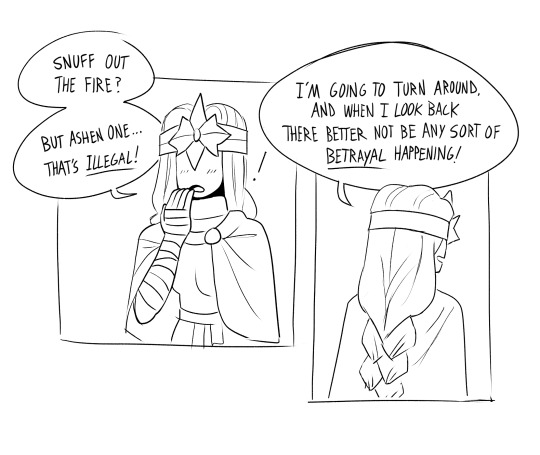
Trying to explain why DS3 Firekeeper is my favorite
#dark souls#dark souls 2#dark souls 3#elden ring#anastacia of astora#emerald herald#fire keeper#melina
7K notes
·
View notes
Text
When Teh AlgorithmTM thinks you'd like some pretty drink pictures, but all you see is Basilisk.

3 notes
·
View notes
Text
Elden Valley
My friend @schrodingersking reminded me that cozy games and open world action RPGs are the same genre for me.
What you have to understand is that Stardew Valley and Elden Ring are the same game to me. Elden Ring is a cozy game and Stardew Valley is a combat game. And also the other way around.
I spend the majority of my time collecting flowers and rocks and insects and fish for cooking and crafting. The discerning gamer will quickly realize that these are the same image:
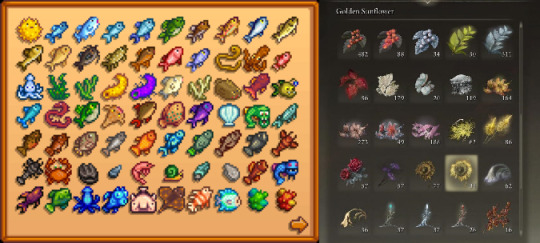
I spend time in both riding around on best boi horse. Look carefully, and you'll see that this is also the same picture:

I spend a lot of time in both completing entirely useless collections of items that I will never fully utilize. Yes, every recipe. Yes, every talisman. To the gamer of taste, the resemblance will be obvious:
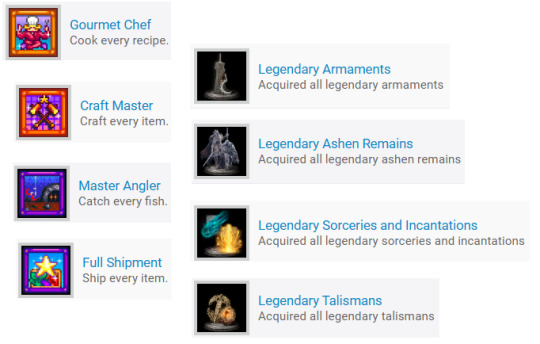
I spend nearly as much time fighting monsters in the Valley as I do in the Lands Between. The perceptive gamer will see that these are also the same picture:

Both games are beautiful and extremely relaxing.
These are the same game to me.
#stardew valley#elden ring#collectibles#cozy games#action rpg#shitpost#i'm dead serious though#comfort game
10 notes
·
View notes